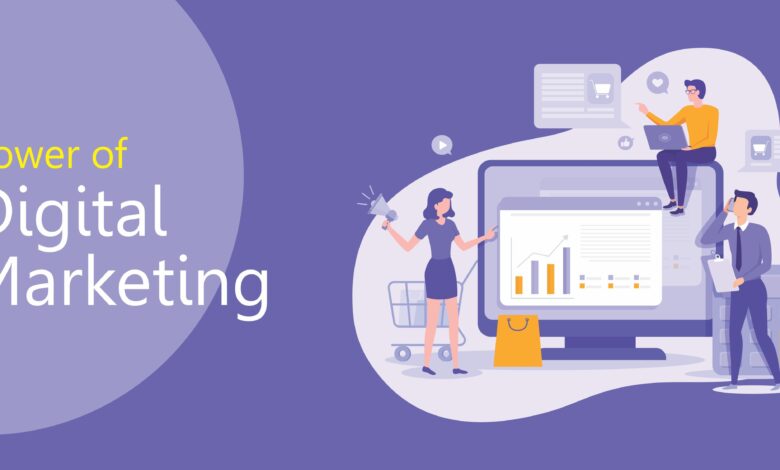Master Digital Marketing: Strategies for Success

In today’s digital age, businesses of all sizes recognize the immense power of digital marketing. As consumers increasingly rely on digital channels for information, entertainment, and purchases, digital marketing has become an indispensable tool for reaching and engaging target audiences. This article explores the various aspects of digital marketing, its benefits, and the strategies businesses can employ to harness its power for growth and success.
The Evolution of Digital Marketing
Digital marketing has come a long way since the early days of the internet. What started as simple banner ads and email campaigns has evolved into a complex ecosystem of channels, technologies, and strategies. Today, digital marketing encompasses a wide range of tactics, including search engine optimization (SEO), pay-per-click (PPC) advertising, social media marketing, content marketing, email marketing, and more.
The rise of smartphones and mobile devices has further revolutionized digital marketing. Mobile-first strategies have become essential as consumers spend more time on their devices. The advent of social media platforms has also transformed the way businesses interact with their customers, enabling real-time engagement, customer service, and brand building.
Benefits of Digital Marketing
Digital marketing offers numerous benefits to businesses, making it a crucial component of modern marketing strategies. Some of the key advantages include:
1. Cost-effectiveness: Compared to traditional marketing methods, digital marketing is often more cost-effective. Online advertising platforms, such as Google Ads and Facebook Ads, allow businesses to reach their target audience with precision, optimizing ad spend and minimizing waste.
2. Targeted reach: Digital marketing enables businesses to target specific demographics, interests, and behaviors. Through data-driven insights and advanced targeting options, businesses can deliver personalized messages to the right audience at the right time, increasing the likelihood of conversion.
3. Measurable results: One of the greatest strengths of digital marketing is its measurability. Digital marketing platforms provide detailed analytics and metrics, allowing businesses to track the performance of their campaigns in real-time. This data-driven approach enables continuous optimization and improvement of marketing strategies.
4. Global reach: The internet has no geographical boundaries, making digital marketing a powerful tool for businesses to expand their reach globally. Through digital channels, even small businesses can tap into international markets and compete with larger players.
5. Engagement and interactivity: Digital marketing facilitates two-way communication between businesses and their customers. Social media platforms, in particular, allow for direct engagement, fostering relationships and building brand loyalty. Interactive content, such as polls, quizzes, and live videos, further enhances user engagement.
6. Flexibility and adaptability: Digital marketing strategies can be quickly adjusted and refined based on real-time data and insights. This flexibility allows businesses to respond to market changes, customer feedback, and emerging trends, ensuring their marketing efforts remain relevant and effective.
Key Digital Marketing Strategies
To harness the power of digital marketing, businesses must employ a combination of strategies tailored to their goals, target audience, and industry. Some of the essential digital marketing strategies include:
Search Engine Optimization (SEO)
SEO involves optimizing a website’s content, structure, and technical elements to improve its visibility and ranking in search engine results pages (SERPs). By appearing at the top of relevant search results, businesses can attract organic traffic, build credibility, and generate leads.
Key SEO tactics include keyword research, on-page optimization, link building, and technical optimization. Creating high-quality, informative, and engaging content is crucial for SEO success. Regularly updating the website with fresh and relevant content helps maintain search engine rankings and attract repeat visitors.
Pay-Per-Click (PPC) Advertising
PPC advertising allows businesses to place ads on search engines and other online platforms, paying only when a user clicks on the ad. Platforms like Google Ads and Microsoft Advertising enable businesses to target specific keywords, demographics, and locations, ensuring their ads reach the most relevant audience.
Effective PPC campaigns require careful keyword selection, compelling ad copy, and landing page optimization. Continuously monitoring and adjusting bids, ad groups, and targeting options based on performance data helps maximize return on investment (ROI) and minimize cost per acquisition (CPA).
Social Media Marketing
Social media platforms, such as Facebook, Instagram, Twitter, and LinkedIn, have become powerful tools for businesses to connect with their audience, build brand awareness, and drive engagement. Each platform has its unique features and demographics, requiring tailored strategies.
Effective social media marketing involves creating and sharing valuable content, engaging with followers, running social media ad campaigns, and leveraging influencer partnerships. Consistently posting relevant and visually appealing content, responding to comments and messages, and participating in industry conversations help build a loyal and engaged community.
Content Marketing
Content marketing focuses on creating and distributing valuable, relevant, and consistent content to attract and retain a clearly defined audience. By providing informative and engaging content, businesses can establish themselves as thought leaders, build trust, and nurture relationships with potential customers.
Content marketing can take various forms, such as blog posts, articles, infographics, videos, podcasts, and e-books. The key is to understand the target audience’s needs, interests, and pain points and create content that addresses those aspects. Promoting content through social media, email marketing, and guest posting amplifies its reach and impact.
Email Marketing
Email marketing remains one of the most effective digital marketing channels, allowing businesses to directly communicate with their subscribers. By building a targeted email list and sending personalized, relevant, and timely messages, businesses can nurture leads, drive conversions, and retain customers.
Effective email marketing campaigns require segmentation, personalization, and compelling subject lines. Providing value through informative content, exclusive offers, and timely updates keeps subscribers engaged and reduces unsubscribe rates. Regularly cleaning the email list and monitoring metrics such as open rates, click-through rates, and conversion rates helps optimize email marketing efforts.
Video Marketing
Video has emerged as a powerful medium for digital marketing, capturing attention and conveying messages effectively. Platforms like YouTube, Instagram, and TikTok have made video content consumption and sharing easier than ever.
Creating engaging and informative video content, such as product demos, tutorials, behind-the-scenes footage, and testimonials, can help businesses connect with their audience on a deeper level. Optimizing videos for search engines, promoting them through social media and email, and leveraging video ads can significantly boost visibility and engagement.
Influencer Marketing
Influencer marketing involves partnering with individuals who have a significant following and influence within a specific niche or industry. By collaborating with relevant influencers, businesses can tap into their audience, gain credibility, and drive brand awareness.
Successful influencer marketing campaigns require careful selection of influencers whose values and audience align with the brand. Establishing clear goals, guidelines, and metrics for the collaboration ensures mutual benefits and measurable results. Micro-influencers, with smaller but highly engaged followings, can often provide better ROI than mega-influencers.
Measuring and Optimizing Digital Marketing Performance
To maximize the power of digital marketing, businesses must continuously measure and optimize their efforts. Key performance indicators (KPIs) vary depending on the specific goals and strategies employed. Some common KPIs include website traffic, lead generation, conversion rates, engagement rates, and ROI.
Digital marketing platforms provide comprehensive analytics and reporting tools, allowing businesses to track and analyze performance data. Google Analytics, for example, offers insights into website traffic, user behavior, and conversion paths. Social media platforms have built-in analytics features that provide data on reach, engagement, and audience demographics.
Regularly reviewing and interpreting performance data helps identify areas for improvement and optimization. A/B testing, or split testing, is a valuable technique for comparing different versions of ads, landing pages, or email subject lines to determine which performs better. Continuously refining and adapting digital marketing strategies based on data-driven insights ensures ongoing improvement and success.
Integration and Omnichannel Marketing
To maximize the power of digital marketing, businesses must integrate their various channels and strategies into a cohesive omnichannel approach. Omnichannel marketing recognizes that customers interact with brands across multiple touchpoints and aims to provide a seamless and consistent experience throughout the customer journey.
Integrating digital marketing channels, such as social media, email, and website, allows businesses to create a unified brand message and deliver personalized experiences. For example, retargeting ads can remind customers of products they viewed on the website, while personalized email campaigns can provide tailored recommendations based on past purchases.
Omnichannel marketing also involves integrating offline and online channels. Tracking offline conversions, such as in-store purchases resulting from online ads, provides a more comprehensive view of digital marketing’s impact. Utilizing QR codes, mobile apps, and location-based marketing can bridge the gap between offline and online experiences.
Future of Digital Marketing
As technology continues to evolve, digital marketing will undoubtedly adapt and transform. Emerging trends and technologies, such as artificial intelligence (AI), voice search, and augmented reality (AR), are already shaping the future of digital marketing.
AI-powered chatbots and personalization engines are revolutionizing customer service and user experiences. Voice search optimization is becoming increasingly important as more consumers rely on virtual assistants like Siri and Alexa. AR is transforming product visualization and try-on experiences, particularly in the e-commerce and retail sectors.

The growing importance of data privacy and security will also impact digital marketing practices. Businesses must navigate evolving regulations, such as the General Data Protection Regulation (GDPR) and the California Consumer Privacy Act (CCPA), while maintaining customer trust and transparency.
As digital marketing continues to evolve, businesses must stay agile, adaptable, and proactive in embracing new technologies and strategies. Continuous learning, experimentation, and innovation will be key to staying ahead in the ever-changing digital landscape.
Conclusion
The power of digital marketing lies in its ability to reach, engage, and convert target audiences effectively. By leveraging various strategies, such as SEO, PPC advertising, social media marketing, content marketing, email marketing, video marketing, and influencer marketing, businesses can achieve their marketing goals and drive growth.
To harness the full potential of digital marketing, businesses must adopt a data-driven approach, continuously measuring and optimizing their efforts. Integrating channels and strategies into an omnichannel approach ensures a seamless and consistent customer experience.
As the digital landscape evolves, businesses must stay attuned to emerging trends and technologies while prioritizing customer needs and experiences. By embracing the power of digital marketing and adapting to change, businesses can thrive in the digital age and achieve long-term success.



